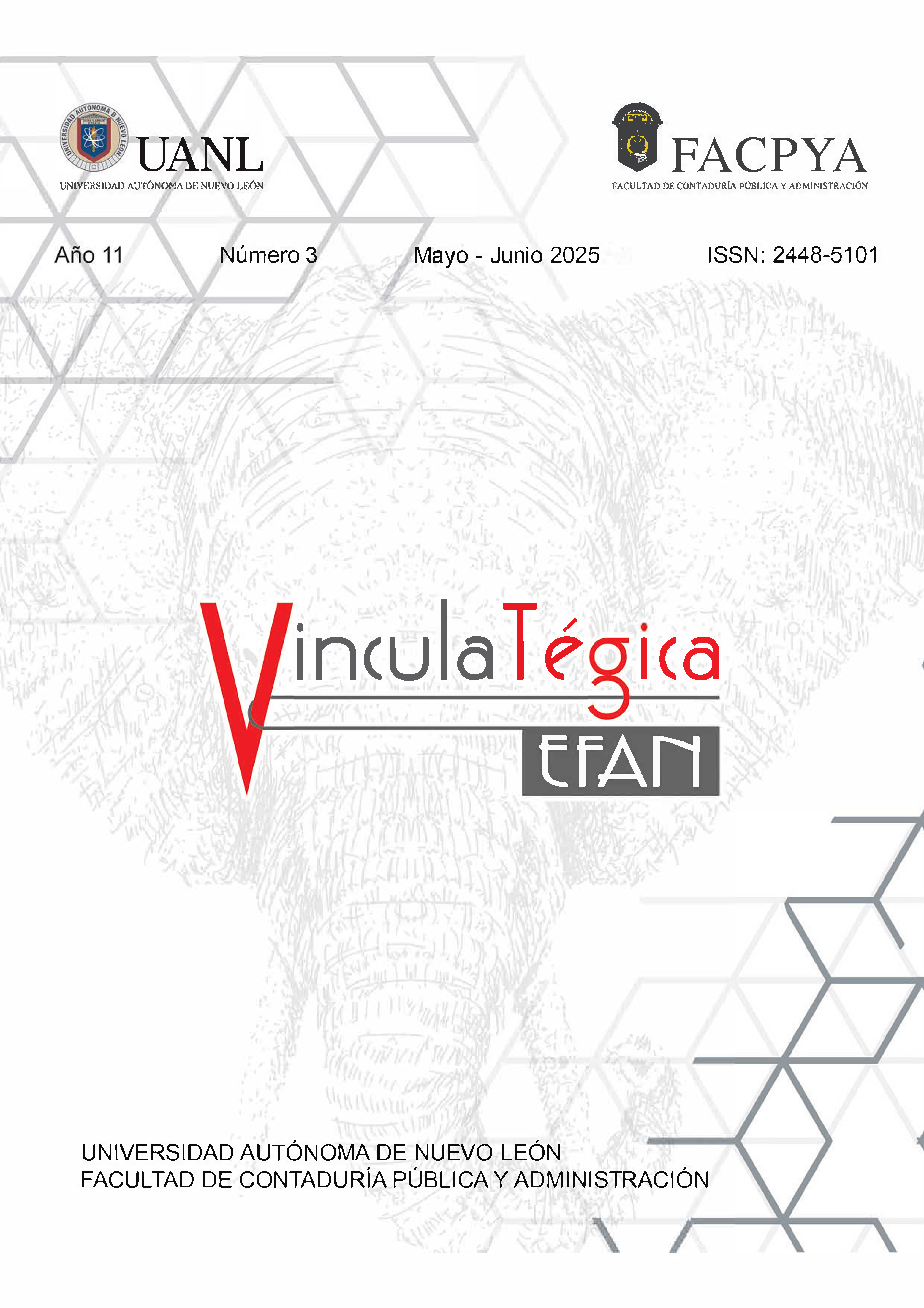Generation of social entrepreneurship projects at a university in northern Mexico through the organizational misión
DOI:
https://doi.org/10.29105/vtga11.3-1079Keywords:
Social entrepreneurship, organizational culture trait, Mexico, mission, university studentsAbstract
Entrepreneurship today has been widely studied in order to understand and comprehend the ability of people to start a new business or product, this involves understanding the effort and dedication to these work projects, as well as the members who participate in it.members who participate in it. Likewise, the person who undertakes must have that sense of accomplishment which must be reflected in his mission as an element of transcendence in the project. Therefore, the study worked under a quantitative and transversal approach within a public institution in the metropolitan area of Monterrey, the sample being 100% of the student population that participated in various social entrepreneurship projects. The results show the influence that the mission as a factor of aspiration is. The results show the influence that the mission as an aspiration factor is influenced by the efficiency of the projects from the generation of behaviors within the work groups, which are reflected in their operation and prevalence over time.
Downloads
References
Bizkaia. (2016). Emprendimiento con perspectiva de género. Buenas prácticas. Disponible en: https://www.ilo.org/wcmsp5/groups/public/---americas/---ro-lima/---sro- san_jose/documents/publication/wcms_179034.pdf
Bombini, G., & Labeur, P. (2013). Escritura en la formación docente: los géneros de la práctica. Enunciación, 18(1), 19–29. https://doi.org/10.14483/22486798.5715 DOI: https://doi.org/10.14483/22486798.5715
Denison, D., Nieminen, L. & Kotroba, L. (2011). Diagnosing organizational cultures: A conceptual and empirical review of culture effectiveness surveys, Europan Journal of work an organizational psychology, 23(1), 145-161 DOI: https://doi.org/10.1080/1359432X.2012.713173 DOI: https://doi.org/10.1080/1359432X.2012.713173
Duarte, S. (2013). Factores de terminantes de la actitud emprendedora investigativa en científicos del Paraguay. CTS, 8(23), 67-87.
Espíritu, R., González, R., & Alcaraz, E. (2012). Desarrollo de competencias emprendedoras: Un análisis explicativo con estudiantes universitarios. Cuadernos de Estudios Empresariales, 22(22), 29-53. Disponible en: https://dialnet.unirioja.es/servlet/articulo?codigo=4730220
Fey, F. Denison, R. (2003). Organizational Culture And Effectiveness: Can American Theory Be Applied In Russia?. Paper 598 Davidson Institute Working Paper Series. DOI: https://doi.org/10.2139/ssrn.577141
González, J., & Rodríguez, M. (2008). Diagnóstico y valoración del nivel de desarrollo del espíritu empresarial (entrepreneurship) de los estudiantes de la Facultad seccional Sogamoso de la UPTC. Pensamiento y Gestión (24), 225-255.
González, M. y Velázquez, L. (2015). El caso del Tecnológico de Monterrey (135-154). España: RedEmprendia.
Guerra, M. y Pizarro, O. (2015). Emprendimiento académico liderado por Mujeres en Chile. En Emprendimiento Femenino en Latinoamérica (53-69). España: RedEmprendia.
Jordán, J., Serrano, B., Pacheco, A., & Brito, L. (2016). Capacidad emprendedora desde la perspectiva de género. Opción, 32 (81), 238-261. Disponible en: https://www.redalyc.org/articulo.oa?id=31048807012
Leiva, J. C. (2008). ¿Nacen empresas de las actividades de fomento al espíritu emprendedor? TEC Empresarial, 2(1), 16-27. Disponible en: https://revistas.tec.ac.cr/index.php/tec_empresarial/article/view/771
Lund, B. (2003). Organizational culture and job satisfaction, Journal of Business and Industrial Marketing, 18(3): 219-236 Disponible en: https://www.emerald.com/insight/content/doi/10.1108/0885862031047313/full/html DOI: https://doi.org/10.1108/0885862031047313
McClelland; E. Swail; J. Bell; J. & Ibbotson; P. (2005). "Following the pathway of female entrepreneurs: A six‐country investigation", International Journal of Entrepreneurial Behavior & Research, 11, (2) 84-107. https://doi.org/10.1108/13552550510590527 DOI: https://doi.org/10.1108/13552550510590527
Melián, A.; Campos, V., Sanchis, P. (2011). Emprendimiento Social Y Empresas De Inserción En España. Aplicación Del Método Delphi Para La Determinación Del Perfil Del Emprendedor Y Las Empresas Sociales Creadas Por Emprendedores. REVESCO: Revista de Estudios Cooperativos. 106: 150-172. DOI: https://doi.org/10.5209/rev_REVE.2011.v106.37377
Ming L. (2005). The Case Análysis On Failures Of Enterprise Internal Control In Mainland China. Cambridge. Journal Of American Academy Of Business.
O’Reilly, Ch. Caldwell, D. Chatman, J. & Doerr, B. (2014). The promise and problems of organizational culture: CEO Personality, Culture and Firm Perfomance, Group &Organization Management 39 (6): 595-625. DOI: https://doi.org/10.1177/1059601114550713 DOI: https://doi.org/10.1177/1059601114550713
Pérez, A. (2019). Qué es emprendimiento: definición y perspectivas. OBS Business School. Disponible en: https://www.obsbusiness.school/blog/que-es-emprendimiento-definicion- y-perspectivas
Robbins, S. & Judge, T. (2007). Organizational Behavior. 12a. Ed. Prentice Hall.
Rodríguez, R. (2016). El rol de la familia en el emprendimiento. septiembre, de El Columnero Sitio web: http://www.elcolumnero.com/rosymer-rodriguez/el-rol-de-la-familia-en-el- emprendimiento
Salazar, J., Guerrero, J., Machado, Y., & Cañedo, R. (2009). Clima y cultura organizacional: dos componentes esenciales en la productividad laboral. ACIMED, 20(4), 67-75. http://scielo.sld.cu/scielo.php?script=sci_arttext&pid=S1024- 94352009001000004&lng=es&tlng=es
Santamaría, E., & Tapia, D. (2017). Emprendimiento y género en México. Disponible en: http://www.caiinno.org/wp-content/uploads/2017/05/Genero-emprendimiento.pdf
Terán Cazares, M. M., Rodríguez Garza, B. N., & Partida Puente, A. (2018). Formación De Una Herramienta Confiable Para Evaluar El Comportamiento De Ciudadanía Y La Cultura Organizacional En México. Revista Hitos 24 (69), 224-245. http://148.236.18.55/bitstream/20.500.12107/3677/1/FORMACI%C3%93N%20DE%20UNA%20HERRAMIENTA%20CONFIABLE.pdf DOI: https://doi.org/10.19136/hitos.a24n69.2766
Vázquez, M. (2015). Emprendimiento universitario en base tecnológica: El caso de mujeres en Argentina. En Emprendimiento Femenino en Latinoamérica (70-93). España: RedEmprendia.
Zabludovsky K. (2013). Empresarias y ejecutivas en México. Diagnóstico y desafíos, IPADE, México. Obtenido de: https://ginazabludovsky.com/2013/07/19/empresarias-y-ejecutivas- en-mexico-diagnosticos-y-desafios/
Downloads
Published
How to Cite
Issue
Section
License
Copyright (c) 2024 María Mayela Terán-Cázares, Ivon Abigail González-Garza, Laura Leticia Gaona-Tamez

This work is licensed under a Creative Commons Attribution 4.0 International License.
a). Authors keep copyright and give the journal the right of the first publication of the work under a Creative Commons attribution license. This license allows others to share the work as long as original authorship and initial publication in this journal is acknowledged.
b). Authors may make other independent and additional contractual agreements for the non-exclusive distribution of the version of the article published in this journal (e.g., include it in an institutional repository or publish it in a book) as long as they clearly indicate that the work was published for the first time in this journal.







